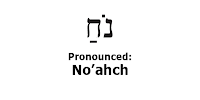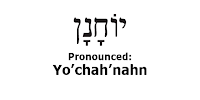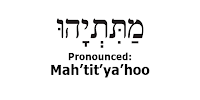Noah
(Are you looking for our Twebrew School Treats about the Hebrew alphabet or our Hebrew Instructional videos? Click here for a directory!)

Click here to hear No’ahch pronounced
There is an interesting debate among the sages regarding the verse “Noah was a righteous man, perfect in his generation” (Genesis 6:10). Does it mean that Noah was a true tzadik (righteous person), or that Noah was righteous only when compared to the rest of his generation?
Noah was given his name by his father, Lamech, who said: “This one will bring us rest from our work and from the toil of our hands, from the ground which God had cursed” (Genesis 5:29). From the very beginning, Noah was destined to have an impact on the world.
Although Noah lived in a time of chaos, when the people were, as the Torah describes them, completely corrupt, he “found grace in the eyes of God” (Genesis 6:8). While Noah had a relationship with God, however, he was not on the best of terms with his neighbors. Throughout the time that he was building the ark, he responded to inquiries about what he was doing, by telling his neighbors that God intended to bring a big flood. They “mocked him, calling him despised old man” (Genesis Rabbah 30:7). What Noah should have done, but did not do, was to reach out to his contemporaries and show them how to talk with God and to repent their wicked ways.
It would be wonderful to say that Noah’s life was completed as meaningfully as it had begun. But, the journey in the ark and seeing his entire generation (except his family) destroyed, had its effect on him. After thanking God for his salvation, Noah’s second act on dry land, unfortunately, was to plant a vineyard and get drunk. He never regained the stature that he had before and during the flood, and the Torah moves its focus onto his sons.
Copyright © 2011 National Jewish Outreach Program. All rights reserved.

Click here to hear No’ahch pronounced
There is an interesting debate among the sages regarding the verse “Noah was a righteous man, perfect in his generation” (Genesis 6:10). Does it mean that Noah was a true tzadik (righteous person), or that Noah was righteous only when compared to the rest of his generation?
Noah was given his name by his father, Lamech, who said: “This one will bring us rest from our work and from the toil of our hands, from the ground which God had cursed” (Genesis 5:29). From the very beginning, Noah was destined to have an impact on the world.
Although Noah lived in a time of chaos, when the people were, as the Torah describes them, completely corrupt, he “found grace in the eyes of God” (Genesis 6:8). While Noah had a relationship with God, however, he was not on the best of terms with his neighbors. Throughout the time that he was building the ark, he responded to inquiries about what he was doing, by telling his neighbors that God intended to bring a big flood. They “mocked him, calling him despised old man” (Genesis Rabbah 30:7). What Noah should have done, but did not do, was to reach out to his contemporaries and show them how to talk with God and to repent their wicked ways.
It would be wonderful to say that Noah’s life was completed as meaningfully as it had begun. But, the journey in the ark and seeing his entire generation (except his family) destroyed, had its effect on him. After thanking God for his salvation, Noah’s second act on dry land, unfortunately, was to plant a vineyard and get drunk. He never regained the stature that he had before and during the flood, and the Torah moves its focus onto his sons.
Copyright © 2011 National Jewish Outreach Program. All rights reserved.


Comments
Post a Comment